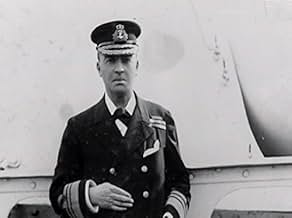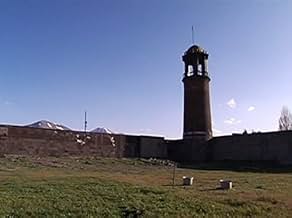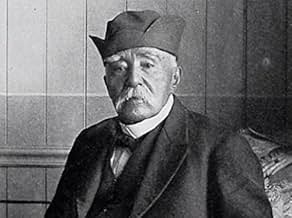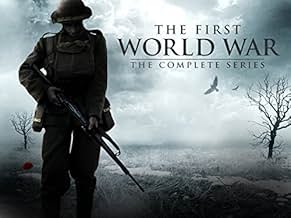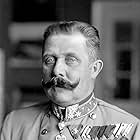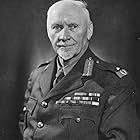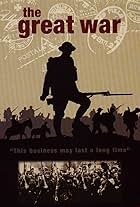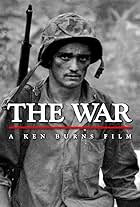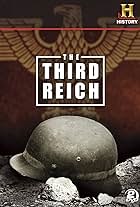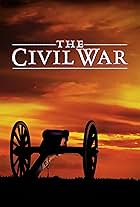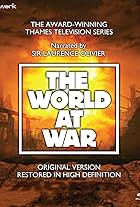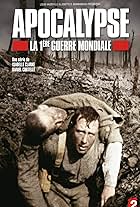The First World War
- TV Mini Series
- 2003
- 8h 20m
IMDb RATING
8.6/10
1.5K
YOUR RATING

2
This video file cannot be played.(Error Code: 224003)
Play clip2:17
Watch What to Watch: Three Series to Stream in Honor of Veterans
2
A comprehensive survey of the history of World War I.A comprehensive survey of the history of World War I.A comprehensive survey of the history of World War I.
Browse episodes
Featured reviews
Incredibly detailed account of the war and the European political landscape in the early 1900s. The only thing I took issue with is the perspective of Russia going into the war. Russia had come off a long unproductive conflict on the Korean peninsula. The Russian generals were well aware of Germany's military might and superiority over their capability. They tried in vain to advise the czar against getting involved as they strongly believed they would be crushed by the Germans. I'm also not sure that Germany went into the war with the trepidation that is expressed in the documentary. This is the first documentary I've seen that correctly depicts the Kaiser for the monster he was. Also it does an excellent job of reviewing the worldwide nature of the war and the broad scope of the German attack including fomenting internal turmoil within its adversaries. This is must viewing for any student of history.
I was eagerly looking forward to this ten episode, four DVD set (8 hours and 23 minutes in all) based on the claims on the box of previously unseen film footage and newly accessible archival material from Central and Eastern European sources and most especially the ties to a book by a "professor" (presumably of history - Hew Strachan). Unfortunately, as assembled (in an initially promising chronological format) by BBC 4, there is little or no pretense of objective history and far too many omissions and distortions in the service of a strictly British viewpoint. The over all effect, despite copious quotations from participants on all sides, is like a history of World War II's "D-Day" told entirely from Field Marshall Montgomery's aide de camp's viewpoint.
The vast majority of film footage (mostly acknowledged - but not some of the obvious naval model work; possibly from faked "newsreels"?) is from 1920's and 30's film reconstructions and fictionalizations mixed with color footage of locales as they look today. While there is interesting period movie footage, it is almost all behind the lines and of close-up non-action scenes and TV cameras scanning across still photos.
One of the single most desired sequences, the final newsreel footage of the Archduke Franz Ferdinand leaving the Serajevo City Hall moments before his assassination, is only shown in the abbreviated and already much circulated cut. The reasons for Franz Ferdinand - a fascinating, complex figure given very short shrift here (and his Sophie) being in Bosnia that day (their 14th Wedding Anniversary) are totally omitted - as are any understanding of his reigning Uncle, Emperor Franz Joseph at the head of a great multi-cultural empire or the reasons the majority of Moslem Bosnia was opposed to Eastern Orthodox Serbian pretensions over their territory since both broke away from the shrinking Ottoman Empire.
Once the war itself started (you will be hard pressed to understand why from the sketchy story told here), the British documentary almost entirely ignores the original combatants but focuses on the British and their conflict with Austria's unsubtle allies in Germany.
Because of the British confrontations (to their considerable discomfort) with the Ottoman Turk, much time is spent on this front, allowing at least rudimentary (and that's about all) discussion of the source of the continuing Armenian question in Episode Four, but even here, there is almost no followable line of the way the Ottoman wobbled in and out of the war until finally committing to the Central Powers following the second Russian Revolution in 1917, removing them from the war. There is even less discussion of impact of the tenuous Japanese alliance with the Russians and British springing from the settlement of the Russo-Japanese War in 1905.
A far better look at the complexity of World War I (although neither attempt or claim to be as complete in the material covered), with far more actual footage from the period in question is available in several documentaries ranging from Hollywood GOES TO WAR to WORLD WAR I IN COLOR. This Anglophile attempt at history is only for the dedicated Anglophile looking for entertainment pretending to be serious, not the serious amateur historian who will see too many holes spoiling the fun.
The vast majority of film footage (mostly acknowledged - but not some of the obvious naval model work; possibly from faked "newsreels"?) is from 1920's and 30's film reconstructions and fictionalizations mixed with color footage of locales as they look today. While there is interesting period movie footage, it is almost all behind the lines and of close-up non-action scenes and TV cameras scanning across still photos.
One of the single most desired sequences, the final newsreel footage of the Archduke Franz Ferdinand leaving the Serajevo City Hall moments before his assassination, is only shown in the abbreviated and already much circulated cut. The reasons for Franz Ferdinand - a fascinating, complex figure given very short shrift here (and his Sophie) being in Bosnia that day (their 14th Wedding Anniversary) are totally omitted - as are any understanding of his reigning Uncle, Emperor Franz Joseph at the head of a great multi-cultural empire or the reasons the majority of Moslem Bosnia was opposed to Eastern Orthodox Serbian pretensions over their territory since both broke away from the shrinking Ottoman Empire.
Once the war itself started (you will be hard pressed to understand why from the sketchy story told here), the British documentary almost entirely ignores the original combatants but focuses on the British and their conflict with Austria's unsubtle allies in Germany.
Because of the British confrontations (to their considerable discomfort) with the Ottoman Turk, much time is spent on this front, allowing at least rudimentary (and that's about all) discussion of the source of the continuing Armenian question in Episode Four, but even here, there is almost no followable line of the way the Ottoman wobbled in and out of the war until finally committing to the Central Powers following the second Russian Revolution in 1917, removing them from the war. There is even less discussion of impact of the tenuous Japanese alliance with the Russians and British springing from the settlement of the Russo-Japanese War in 1905.
A far better look at the complexity of World War I (although neither attempt or claim to be as complete in the material covered), with far more actual footage from the period in question is available in several documentaries ranging from Hollywood GOES TO WAR to WORLD WAR I IN COLOR. This Anglophile attempt at history is only for the dedicated Anglophile looking for entertainment pretending to be serious, not the serious amateur historian who will see too many holes spoiling the fun.
You would not recommend reading only one history book, so why would anyone recommend only one documentary about World War I? This is a good documentary because it covers a great deal and very engagingly, but sometimes it tries to cover too much and necessarily leaves gaps.
If you watch other documentaries, you will find out that the first great tank breakthrough was preceded by a tank failure and that the British Expeditionary Force was so unprepared for the breakthrough when it came that they failed to send enough troops into the breach to secure it, leading to the German recapture of the temporarily lost territory.
There is confusion, too, as when it is said that German commander von Hutier's attack on Amiens, France had no purpose, but a few minutes later it is said that when Ludendorff decided to attack Amiens he had an objective of smashing the railroad nexus there. Had Hutier succeeded, wouldn't that have served the same purpose even if accidentally?
A mass of information is presented that dizzies the old hand let alone the beginner, but even so, I was glad that this documentary offers a wealth of stimulating information about all sides of the conflict. The fact that it is British-made gives it an unavoidable bias that is made up for by its attempt to bring other nation's voices into the narrative, using the accounts of both well-known and relatively unknown participants.
There are many documentaries about World War I that are also good. Some, for example, focus more than this one on the war from the point of view of those outside of Europe. This one gives a lot of information about that aspect of the war even though it tries to cover too much ground to tell the viewer all the details. This is a survey, and a pretty good starting point. Learn more about World War I, and you will come to see that there are other opinions on some of the topics. There is more subject matter than this documentary had time to cover, and you might even think that what they left out is awfully important. You might, nevertheless, always remember "The First World War" fondly as an equally informative and moving introduction.
If you watch other documentaries, you will find out that the first great tank breakthrough was preceded by a tank failure and that the British Expeditionary Force was so unprepared for the breakthrough when it came that they failed to send enough troops into the breach to secure it, leading to the German recapture of the temporarily lost territory.
There is confusion, too, as when it is said that German commander von Hutier's attack on Amiens, France had no purpose, but a few minutes later it is said that when Ludendorff decided to attack Amiens he had an objective of smashing the railroad nexus there. Had Hutier succeeded, wouldn't that have served the same purpose even if accidentally?
A mass of information is presented that dizzies the old hand let alone the beginner, but even so, I was glad that this documentary offers a wealth of stimulating information about all sides of the conflict. The fact that it is British-made gives it an unavoidable bias that is made up for by its attempt to bring other nation's voices into the narrative, using the accounts of both well-known and relatively unknown participants.
There are many documentaries about World War I that are also good. Some, for example, focus more than this one on the war from the point of view of those outside of Europe. This one gives a lot of information about that aspect of the war even though it tries to cover too much ground to tell the viewer all the details. This is a survey, and a pretty good starting point. Learn more about World War I, and you will come to see that there are other opinions on some of the topics. There is more subject matter than this documentary had time to cover, and you might even think that what they left out is awfully important. You might, nevertheless, always remember "The First World War" fondly as an equally informative and moving introduction.
10rkehler3
I discovered this program on TubiTV, a free video streaming service, and as some of the other reviewers have mentioned, this is, without a doubt, one of the best WWI documentaries produced to-date. At over eight hours in length, it is a comprehensive and balanced look at the Great War for those of us who did not live through it and do not fully understand the political and social contexts of the day. Unlike most others, it examines not only the causes of, events, and impact of the war as it pertains to western Europe, but also, in great detail, the war's global impact on all the major players, their allies, and colonies around the world. A commendable effort is made to present the narrative from a neutral point of view and and avoid being just another sentimental British or American war documentary. It's not perfect--there are a few topics that probably could have been expanded upon-but this is still an outstanding and informative production and a must-watch for anyone studying WWI or 20th century history.
All aspects are very good. Music, narration, animation and script. Best WW 1 doc by far.
Did you know
- GoofsSome of the video footage, such as a clip showing dead bodies being unloaded from a wagon, is reused multiple times to depict different events of the war.
- How many seasons does The First World War have?Powered by Alexa
Details
Contribute to this page
Suggest an edit or add missing content




